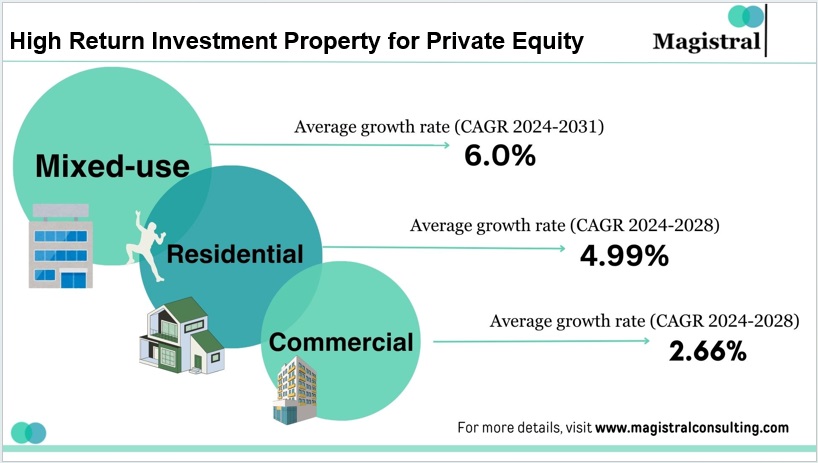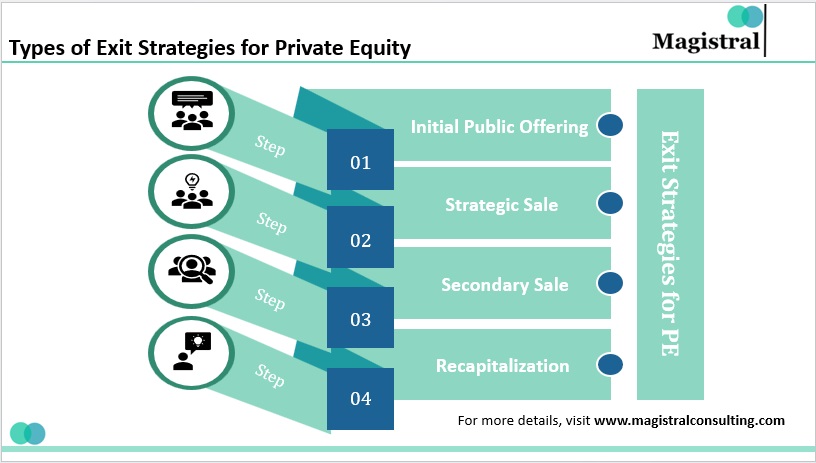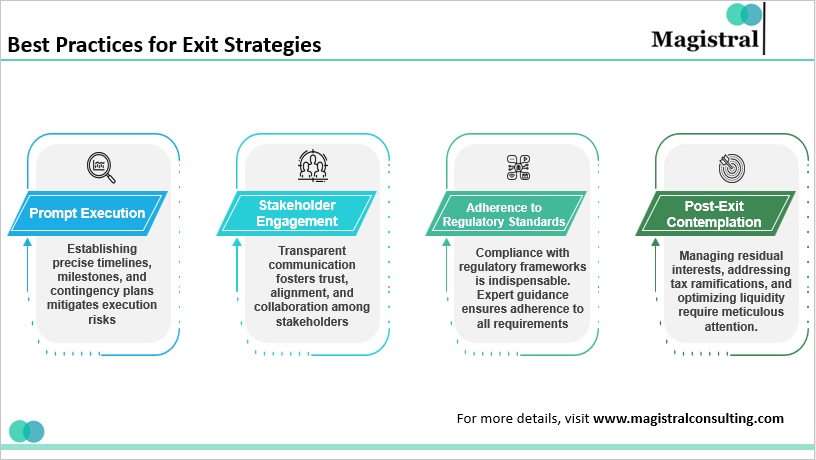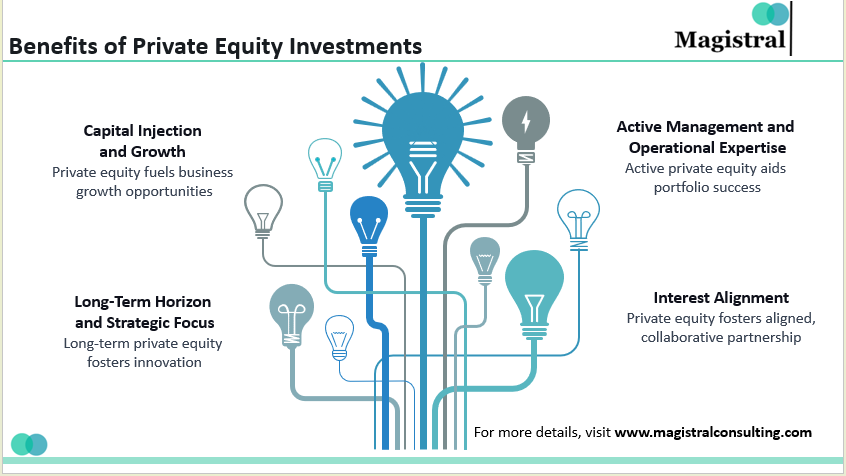
Shivanshi is a Business Development Executive at Magistral Consulting, specializing in lead generation, deal origination, and fundraising support for global startups and PE/VC firms. She works closely with clients across the US, UK, and MENA to deliver customized research and financial solutions. Her expertise lies in connecting investors with high-potential opportunities through data-driven outreach.
Record capital reserves, changing investor expectations, and fast technological disruption define the new era private equity firms are entering. The private equity scene is being shaped by both opportunities and headwinds as world economies progressively calm from past volatility. Companies are changing quickly with developments in artificial intelligence, an explosion in private credit, and more focus on ESG compliance.
Private Equity Firms: Market Size & Growth Trajectory
Although data analytics and artificial intelligence have improved how private equity companies run, essentially the industry’s expansion still depends on capital flows, strategic positioning, and supportive legal surroundings. With estimates pointing toward USD 1.3 trillion by 2034, translating to a CAGR of almost 8.6%, the global private equity market was valued USD 565 billion in 2024 and projects USD 613 billion in 2025.
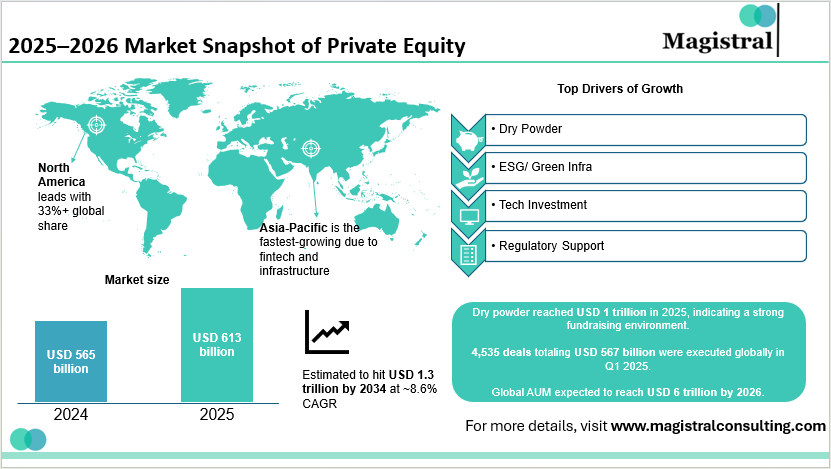
2025–2026 Market Snapshot of Private Equity
Market Leaders by Region
North America maintained its dominance with over 33% of global private equity activity in 2024, while Asia-Pacific emerged as the fastest-growing region, thanks to increasing fintech adoption, infrastructure development, and favourable government support.
Key Agents of Development
Key drivers of growth in the private equity sector included record-high levels of dry powder, which empowered firms to pursue bold investment strategies. There was also accelerated interest in green and digital infrastructure, reflecting a shift toward sustainable and future-ready assets. Additionally, investor appetite remained strong for technology-centric opportunities, further shaping the investment landscape.
Private Equity Firms: Deal Deployment and Dry Powder
With fundraising momentum still strong, dealmakers face the challenge of deploying record-high dry powder effectively. Despite strong capital reserves, economic uncertainty and valuation gaps have slowed down investment velocity, compelling firms to reevaluate their entry strategies. By 2025, dry powder hits historical highs close to USD 1 trillion. This shows strong fundraising; but slow deployment rates.
Capital Overhang Factors
High interest rates have made leveraged buyouts more expensive, while valuation mismatches between buyers and sellers continue to stall negotiations. Ongoing concerns over regulatory developments—particularly in areas like ESG requirements and tariffs—have contributed to cautious capital deployment.
Deal Flow Snapshot
During Q1 2025, the market recorded 4,535 deals worth USD 567 billion globally. While this represents a slight increase from Q4 2024 in volume, the average deal size has reduced due to tighter financing conditions.
Private Equity Firms: Exit Environment & IPO Activity
Exits are making a gradual comeback as IPO windows open and buyer appetite improves. While challenges remain in timing and valuation, strategic exits through public listings and M&A are regaining traction in 2025.Deal entrance slowed, but early 2025 saw signs of rebirth for exits. The 2023 closing IPO window started to reopen.
Exit Highlights
Total global exit value reached USD 186.6 billion across 402 deals in Q1 2025. Notably, Chime’s USD 18.4 billion IPO marked a standout tech exit.
Recovery Drivers
The rebound is being driven by multiple factors, including investor demand for growth sectors like healthcare and technology, reduced inflationary pressure, and general partners (GPs) strategically timing exits to meet LP expectations for liquidity.
Private Equity Firms: Secondary Markets & Liquidity Innovations
As the need for interim liquidity rises, firms are turning to secondary markets and innovative capital structures. GP-led deals and continuation funds are increasingly common tools to extend holding periods and unlock value. To control liquidity, companies depend on secondary markets and NAV-based loans more and more.
Liquidity Tools and Growth
In 2024, the secondary market hit USD 160 billion and is projected to surpass USD 220 billion in 2025. Firms are increasingly turning to NAV-based loans and structured equity solutions to maintain portfolio agility.
Innovative Structures
Firms are embracing innovative structures like GP-led secondaries to enable flexible exits, continuation funds to retain top-performing assets longer, and preferred equity instruments to provide partial liquidity while maintaining future upside.
Private Equity Firms: Sector Preferences in 2025
Investment focus continues to narrow toward high-growth, resilient industries with strong fundamentals. Sectors like healthcare, technology, and sustainable infrastructure lead the way in attracting capital and deal activity. Private equity capital is heavily concentrated in resilient and high.
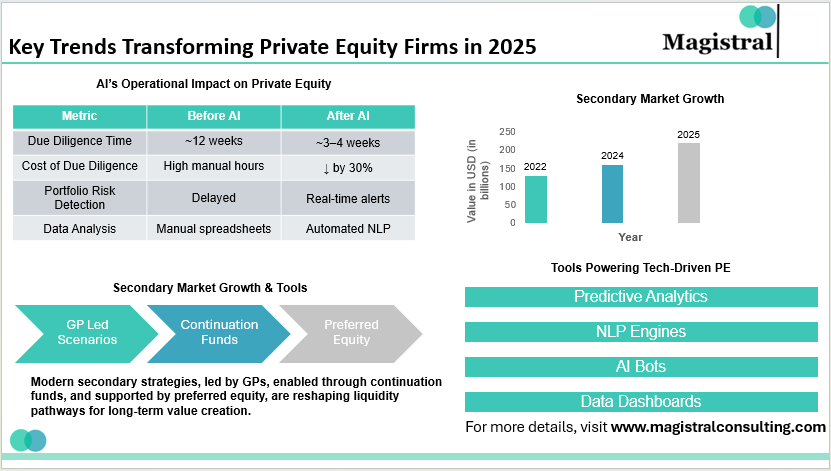
Key Trends Transforming Private Equity Firms in 2025
Sector Highlights and Sector Investment Examples
Technology and healthcare together account for over 40% of total deal activity. Green infrastructure, particularly climate tech and clean energy transition projects, is gaining momentum as firms align investment theses with ESG trends. Private equity firms are actively investing in sectors like data centre infrastructure, SaaS-based enterprise solutions, and healthcare diagnostics, with a focus on expansion, acquisitions, and platform rollups to drive value and scale.
Private Equity Firms: Embracing AI & Technology
Digital transformation is accelerating across the investment lifecycle. Firms are increasingly leveraging AI to automate due diligence, analyse unstructured data, and drive data-backed portfolio decisions. AI is revolutionizing how firms operates, from deal sourcing to post-acquisition monitoring.
Strategic Applications of AI and Performance Impact
Automated due diligence processes help reduce errors and speed up evaluation cycles.
Predictive analytics are being used to forecast portfolio-level risk events.
Natural Language Processing (NLP) assists in extracting key insights from financial documents.
AI is proving its value: due diligence times have decreased by up to 70%, while firms report operational cost savings of around 30%. Additionally, AI tools are helping firms better identify ideal exit timing.
Private Equity Firms: Rise of Private Credit
With traditional lending channels tightening, private credit is emerging as a crucial funding source. It offers more control and customization, allowing firms to tailor solutions for portfolio companies. PE sponsors are covering the void left by traditional lending tightening with private credit.
Private Credit AUM Growth
Private credit now commands USD 1.6 trillion in AUM and is expected to triple by 2029. This form of debt is increasingly being used in leveraged buyouts, refinancings, and growth capital rounds.
Strategic consequences
These strategies offer firms greater control over capital structure design, enabling more tailored and flexible solutions for complex or distressed deals. They also open new opportunities for sector-specific lending, enhancing both agility and strategic reach.
Private Equity Firms: ESG and Regulatory Pressures
Complying with ESG mandates and global regulatory standards has become central to investment strategy. As reporting requirements grow, firms are building robust frameworks to meet transparency and accountability expectations. ESG is no more a choice. Regulatory examination is becoming more and more important worldwide.
ESG Integration
About 60% of firms now have ESG mandates embedded in LP agreements. ESG analysis is increasingly being included in due diligence and valuations.
Regulatory Shifts
Key updates include enhanced ESG disclosure rules from the U.S. SEC and new fundraising frameworks under the EU SFDR (Sustainable Finance Disclosure Regulation).
Private Equity Firms: Investor Sentiment & Fundraising Dynamics
Fundraising remains strong, but investor preferences are shifting toward differentiated strategies and niche asset classes. Firms are under pressure to demonstrate value creation, risk management, and alignment with LP goals. Private equity still attracts a lot of investor interest, but allocations are getting more selective.
LP Behaviour Trends and Fundraising Metrics
Only 28% of LPs plan to increase buyout allocations in 2025, down from 34% in 2024. Instead, they’re pivoting toward secondaries, private credit, and opportunistic funds. Global fundraising in Q1 2025 reached USD 1.1 trillion, with 78% of funds closing at or above target—a strong indication of LP confidence despite broader economic concerns.
Private Equity Firms: Risks & Headwinds
Macroeconomic volatility, inflation concerns, and global uncertainties pose significant challenges. Firms must navigate operational inefficiencies, talent retention issues, and competitive pressures in deal sourcing. Many difficulties still exist even with progress.
Challenges Ahead
Rising interest rates and unpredictable inflation levels.
Regulatory tensions related to tariffs and capital movement.
Middle-market deal competition and pressure to retain top talent.
Private Equity Firms: Future Vision 2026 and Beyond
The private equity ecosystem is evolving fast, and firms that embrace strategic agility will lead the next wave of growth. With AUM expected to reach USD 6 trillion by 2026, firms are doubling down on digitization, diversification, and long-term value creation.
Strategic Priorities for 2026
Strategic innovations in deal structuring have allowed firms to gain greater control over capital structures, enabling them to craft flexible solutions for complex or distressed transactions. This approach also paves the way for targeted, sector-specific lending opportunities, further strengthening investment precision and adaptability. PE firms that integrate innovation with robust governance are best positioned to thrive in the shifting global landscape. Those able to pivot quickly, manage risk proactively, and deliver transparency will define leadership into 2026 and beyond.
Magistral Consulting Services for Private Equity Firms
Magistral Consulting provides complete transaction origination, due diligence, and portfolio management services to private equity companies. They provide target screening, financial modeling, investment research, and pitch decks and PPMs. They aid fund administration, ESG compliance, and LP reporting. Magistral improves operational efficiency and decision-making using AI and data analytics. The firm’s private credit structuring, secondary market assistance, and exit strategy preparation help PE firms expand and compete in a changing investment environment.
About Magistral Consulting
Magistral Consulting has helped multiple funds and companies in outsourcing operations activities. It has service offerings for Private Equity, Venture Capital, Family Offices, Investment Banks, Asset Managers, Hedge Funds, Financial Consultants, Real Estate, REITs, RE funds, Corporates, and Portfolio companies. Its functional expertise is around Deal origination, Deal Execution, Due Diligence, Financial Modelling, Portfolio Management, and Equity Research
For setting up an appointment with a Magistral representative visit www.magistralconsulting.com/contact
About the Author
The article is authored by the Marketing Department of Magistral Consulting. For any business inquiries, you can reach out to prabhash.choudhary@magistralconsulting.com
How is AI transforming private equity operations?
AI is streamlining due diligence, enabling predictive risk analysis, and supporting real-time decision-making. It reduces due diligence time by up to 70% and operational costs by 30%, while also enhancing exit timing precision.
Why is private credit gaining momentum in 2025?
With traditional banks tightening lending, private credit is filling the gap by offering customized, flexible financing. The AUM for private credit stands at USD 1.6 trillion and is projected to triple by 2029.
How are ESG and regulatory changes influencing private equity investments?
Over 60% of private equity firms now embed ESG into LP agreements. With tighter global regulations, firms must prioritize transparency, ESG reporting, and regulatory compliance to attract and retain investors.
